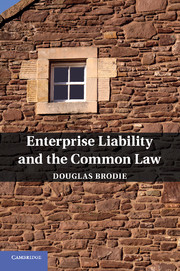Book contents
- Frontmatter
- Contents
- Preface
- Abbreviations
- 1 Introduction
- 2 The reception of Bazley v Curry
- 3 Enterprise risk
- 4 The risk and the individual
- 5 The enterprise
- 6 The borrowed employee
- 7 Independent contractors
- 8 Transferring the burden: the employer's right of indemnity
- 9 Risk and the employment relationship
- 10 Enforcement of the employment contract
- 11 Enterprise liability and non-delegable duties
- 12 Fundamental obligations
- 13 Concluding remarks
- Index
9 - Risk and the employment relationship
Published online by Cambridge University Press: 17 November 2010
- Frontmatter
- Contents
- Preface
- Abbreviations
- 1 Introduction
- 2 The reception of Bazley v Curry
- 3 Enterprise risk
- 4 The risk and the individual
- 5 The enterprise
- 6 The borrowed employee
- 7 Independent contractors
- 8 Transferring the burden: the employer's right of indemnity
- 9 Risk and the employment relationship
- 10 Enforcement of the employment contract
- 11 Enterprise liability and non-delegable duties
- 12 Fundamental obligations
- 13 Concluding remarks
- Index
Summary
As discussed in Chapter 3, recourse to enterprise liability has had a major impact on the allocation of risk between enterprises and third parties. The question then arises whether that is also true in respect of internal relations within the employing organisation where, in contrast to the position between the enterprise and the third party, the relationship between employer and employee is governed by the law of contract. Historically, recourse to the policies underpinning the workmen's compensation legislation would have prompted a positive answer. Where the common law is concerned the picture is very different; whilst the contract of employment serves to allocate risk it does so in a way which appears to be uninfluenced by enterprise liability. The author would suggest that were account taken of the doctrine, risk might be allocated in a quite different way. This chapter will explore one dimension of this issue by focusing on the position in respect of psychiatric harm, which is very much a contemporary issue in a number of jurisdictions.
In truth the ways in which the conduct of the employer's business might impact on the employee's mental health are boundless. Reported cases often reveal complaints of stress stemming from excessive workload but claims will also flow from less commonplace events. Take the Australian case of Vaughan v Patrick Stevedores where the plaintiff sued to recover damages for quite severe psychiatric injuries which he claimed to have sustained when crossing a picket line to enter the port where he was employed by the defendant.
- Type
- Chapter
- Information
- Enterprise Liability and the Common Law , pp. 114 - 138Publisher: Cambridge University PressPrint publication year: 2010



